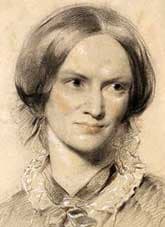Charlotte Brontë
Critique • Works • Views and quotes
 CHARLOTTE BRONTË in 1850 portrait by George Richmond
CHARLOTTE BRONTË in 1850 portrait by George Richmond
Born
Thornton, West Yorkshire, England, 1816
Died
Haworth, West Yorkshire, England, 1855
Publications
Novels, poetry
Genres
Literary
Writing language
English
Place of writing
England
On books, writers and writing
1834
If you like poetry let it be first-rate; Milton, Shakespeare, Thomson, Goldsmith, Pope (if you will, though I don't admire him), Scott, Byron, Camp[b]ell, Wordsworth, and Southey. Now don't be startled at the names of Shakespeare and Byron. Both these were great men, and their works are like themselves. You will know how to choose the good and avoid the evil; the finest passages are always the purest, the bad are invariably revolting, you will never wish to read them over twice.
Letter to Ellen Nussey
1848
Defects there are both in Jane Eyre and Wildfell Hall which it will be the authors' wisdom and duty to endeavour to avoid in future. Other points there are to which they deem it is incumbent upon them freely to adhere, whether such adherence bring popularity or unpopularity, praise or blame. The standard heroes and heroines of novels, are personages in whom I could never, from childhood upwards, take an interest, believe to be natural, or wish to imitate: were I obliged to copy these characters, I would simply—not write at all. Were I obliged to copy any former novelist, even the greatest, even [Walter] Scott, in anything, I would not write. Unless I have something of my own to say, and a way of my own to say it in, I have no business to publish; unless I can look beyond the greatest Masters, and study Nature herself, I have no right to paint; unless I can have the courage to use the language of Truth in preference to the jargon of Conventionality, I ought to be silent.
Letter to W.S Williams
1850
The immature but very real powers revealed in [Emily Brontë's] Wuthering Heights were scarcely recognised; its import and nature were misunderstood; the identity of its author was misrepresented; it was said that this was an earlier and ruder attempt of the same pen which had produced Jane Eyre. Unjust and grievous error! We laughed at it at first, but I deeply lament it now. Hence, I fear, arose a prejudice against the book. That writer who could attempt to palm off an inferior and immature production under cover of one successful effort, must indeed be unduly eager after the secondary and sordid result of authorship, and pitiably indifferent to its true and honourable meed. If reviewers and the public truly believed this, no wonder that they looked darkly on the cheat....
[Anne Brontë's] The Tenant of Wildfell Hall...had likewise an unfavourable reception. At this I cannot wonder. The choice of subject was an entire mistake. Nothing less congruous with the writer’s nature could be conceived. The motives which dictated this choice were pure, but, I think, slightly morbid. She had, in the course of her life, been called on to contemplate, near at hand, and for a long time, the terrible effects of talents misused and faculties abused; hers was naturally a sensitive, reserved, and dejected nature; what she saw sank very deeply into her mind; it did her harm. She brooded over it till she believed it to be a duty to reproduce every detail (of course with fictitious characters, incidents, and situations), as a warning to others. She hated her work, but would pursue it. When reasoned with on the subject, she regarded such reasonings as a temptation to self-indulgence. She must be honest: she must not varnish, soften, or conceal. This well-meant resolution brought on her misconstruction, and some abuse, which she bore, as it was her custom to bear whatever was unpleasant, with mild, steady patience. She was a very sincere and practical Christian, but the tinge of religious melancholy communicated a sad shape to her brief, blameless life.
Preface to Wuthering Heights
I am bound to avow that [Emily] had scarcely more knowledge of the peasantry among whom she lived than a nun has of the country people who sometimes pass her convent gates. My sister's disposition was not naturally gregarious; circumstances favoured and fostered her tendency to seclusion; except to go to church or take a walk on the hills, she rarely crossed the threshold of home. Though her feeling for the people round was benevolent, intercourse with them she never sought; nor, with very few exceptions, ever experienced. And yet she know them: knew their ways, their language, their family histories; she could hear of them with interest, and talk of them with detail, minute, graphic, and accurate; but with them, she rarely exchanged a word.
Editor's Preface to the Second Edition of Wuthering Heights.
Critique • Works • Views and quotes

